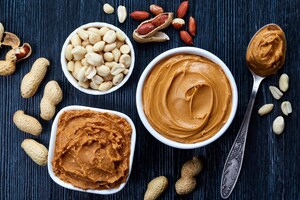
Peanut Protein, Bioactives Keep Arteries Open
Study shows new way peanuts promote heart health
ALEXANDRIA, Va., March 30, 2017 /PRNewswire/ -- Research from The Pennsylvania State University shows a new way in which peanuts may reduce the risk of heart disease. This study, published in The Journal of Nutrition, is the first to show that peanuts, especially peanut protein and bioactives, help keep your arteries flexible.
Levels of fat in the blood rise rapidly after a high fat meal, causing blood vessels to become stiff. This makes your heart work harder to pump blood through the 100 thousand miles of blood vessels in your body, increasing the risk of heart disease and stroke.
In this study, participants who ate peanuts as part of a meal containing 50% fat reduced the rise in blood triglycerides by 32%. In addition, peanuts also caused the participants' arteries to remain open and flexible.
The researchers think the peanut protein, along with bioactives, vitamins and minerals play a major role in preventing this stiffening response. "Since the macronutrients were matched between the two shakes, we don't think that it was the mono- and polyunsaturated fatty acids in the peanuts that affected the response," according to lead researcher Dr. Penny Kris-Etherton. "The plant protein in peanuts, and specifically the amino acid arginine, along with the many other nutrients in peanuts likely played a role."
Peanuts contain more protein than any other nut and, more arginine than most other foods. This is important because arginine is used to make nitric oxide, a vasodilator that helps keep blood vessels open and elastic.
Peanuts contain a rich assortment of bioactives, including resveratrol, plant sterols, flavonoids and antioxidants. Peanuts are also a source of dozens of vitamins and minerals, including niacin, folate, biotin, vitamin E, copper, manganese, molybdenum, and phosphorus.
Dr. Kris-Etherton states "the many nutrients and bioactives in peanuts have multiple health benefits, including the ability to blunt postprandial triglyceride response and prevent arteries from getting stiff after a high fat meal."
To isolate the effects of peanut protein and bioactives, researchers prepared two shakes: a "control" shake containing a mixture of healthy oils, fiber, and protein from egg whites, and a shake containing peanuts. The fat content in the control shake was an exact match to that of the peanut shake, allowing researchers to test the effects of peanut protein and bioactives specifically.
Overweight and obese- but otherwise healthy- men had blood vessel flexibility measured using an ultrasound technique called flow-mediated dilation (FMD), and took blood samples to measure blood triglycerides.
This study is novel because it shows a new way in which peanuts reduce the risk of heart disease. Peanuts received a FDA Qualified Health Claim for Heart Health in 2003. It was based primarily on studies showing benefits of the good mono- and polyunsaturated fats in peanuts. However, this study is the first to demonstrate that peanut protein and bioactives keep your arteries healthy and also contribute to reducing the risk of heart disease.
When you sit down to have a meal, give your heart a break: eat peanuts! For more information on heart health and nuts, visit peanut-institute.org and peanutpower.org.
Liu X, Hill AM, West SG, Gabauer RM, McCrea CE, Fleming JA, Kris-Etherton PM. Acute Peanut Consumption Alters Postprandial Lipids and Vascular Responses in Healthy Overweight or Obese Men. J Nutr 2017.
The Peanut Institute is a non-profit organization that supports nutrition research and educational programs that promote healthier diet patterns and lifestyles.
SOURCE The Peanut Institute






Share this article